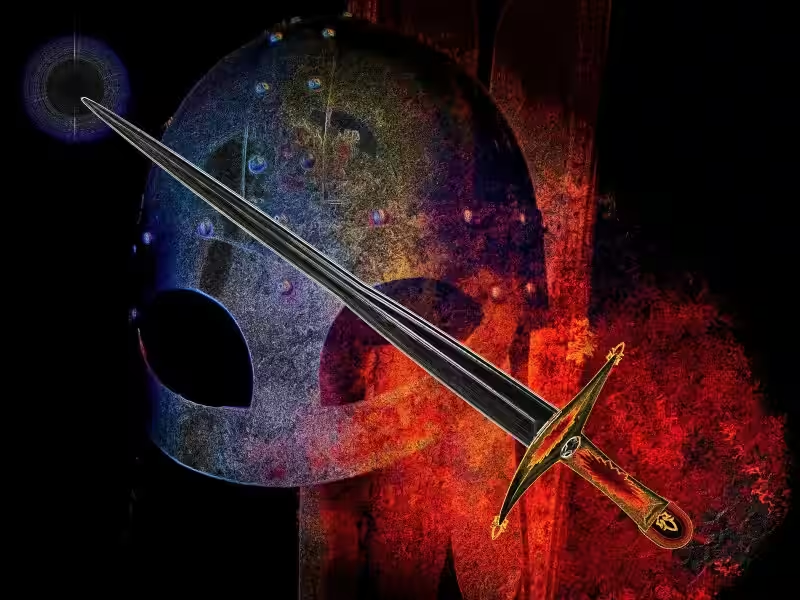What Does a Sword Symbolize?

The sword, a seemingly simple weapon, holds a surprisingly complex and multifaceted symbolism across cultures and throughout history. What does a sword symbolize? The answer depends heavily on the context—religious, cultural, or even personal—in which it's presented. This exploration will delve into the diverse meanings associated with this iconic object.
The Sword in Religious Symbolism: A Double-Edged Meaning
The Bible, for instance, offers a rich tapestry of interpretations regarding what does a sword symbolize. It's not a single, static image but a dynamic symbol whose meaning shifts depending on the narrative.
One dominant theme is divine judgment and wrath. God, or divine agents, frequently wield swords to deliver punishment, showcasing His power and the consequences of disobedience. The plagues of Egypt, for example, often depict the angel of the Lord with a sword, symbolizing God's judgment on Pharaoh's stubbornness. Similarly, the apocalyptic imagery of Revelation utilizes swords as instruments of final judgment, emphasizing God's sovereignty and the ultimate reckoning for sin. This perspective highlights the sword's destructive potential and association with the consequences of actions.
However, the sword also represents protection and deliverance. While often a tool of destruction, it can also serve as a shield, safeguarding God's people. God's protective promises are sometimes depicted metaphorically using a sword, suggesting defense against enemies and a guarantee of safety. The concept of God's word as a "two-edged sword" (Hebrews 4:12) perfectly encapsulates this duality: it judges and convicts, yet simultaneously purifies and protects believers. The sword, therefore, is not simply an instrument of destruction but a potent symbol of both threat and security, depending on perspective.
Spiritual Warfare and the Word of God
Beyond the physical realm, the sword takes on a crucial role in spiritual warfare. Believers engage in a constant battle against evil, and the sword often symbolizes the weapons of this conflict. Paul's writings in Ephesians 6:17 refer to the "sword of the Spirit, which is the word of God," highlighting the Bible as the primary weapon in this spiritual fight. This interpretation transforms the sword from a literal blade to a spiritual one—the power of God's truth combating falsehood and deceit. This highlights the potent defensive and offensive capabilities of faith.
The Sword Beyond the Bible: Cultural and Historical Interpretations
The sword's symbolism extends far beyond the religious. Across many cultures, it consistently represents themes of power, justice, and spiritual authority.
The association with purification and divine power is significant. The image of a wavy, flame-like double-edged sword, a frequent motif in alchemy, embodies fire and signifies not just power and justice but also light, honor, and authority. This connection to the divine is reinforced by its portrayal as a magical instrument bestowed upon heroes to champion righteous causes, as seen in Arthurian legends. In such contexts, the sword embodies the king's authority and the chivalric code his knights uphold. The sword, therefore, becomes a symbol of righteous leadership and the defense of justice.
In Japanese culture, the katana, far more than just a weapon, embodies the samurai's honor, skill, and unwavering loyalty to their lord. It reflects the bushido code—a warrior's ethical code emphasizing courage, discipline, and self-sacrifice. This illustrates the sword's ability to symbolize profound personal and cultural values. Similarly, in Hinduism and Sikhism, the double-edged sword represents divine power to combat evil and protect believers, wielded by deities like Shiva and Kali. The Khanda, a specific type of double-edged sword, represents the strength and defense of the Sikh community. This illustrates the sword's consistent portrayal as a protector of faith and its adherents.
Power, Authority, and the Modern World
The sword's symbolism remains potent even in the modern world. Sports teams, military units, and various organizations utilize its imagery to evoke strength, power, and honor, connecting to a rich historical legacy. This enduring presence underlines the sword's timeless ability to represent ideals of authority, justice, and spiritual might across cultures and time periods. It's a testament to the enduring power of its symbolism, even in a world increasingly devoid of literal swordplay. The enduring power of what does a sword symbolize is a reflection of our continued fascination with strength, justice, and the struggle between good and evil.
From the divine judgments in the Bible to the samurai's unwavering loyalty in Japan, the sword's meaning remains deeply rooted in power, justice, and faith. Its enduring legacy is a testament to its multifaceted symbolism and its continued relevance in human culture. Understanding what does a sword symbolize requires considering not just the blade itself, but the context in which it appears.
Frequently Asked Questions: What Does a Sword Symbolize?
The symbolism of a sword is rich and complex, varying across cultures, religions, and historical periods. While often associated with violence, its meaning extends far beyond simple weaponry.
What does a sword symbolize in the Bible?
The biblical symbolism of a sword is multifaceted and context-dependent. It doesn't have one single meaning but represents various concepts, both positive and negative:
-
Judgment and Divine Wrath: God's judgment and punishment are often symbolized by a sword, representing the consequences of disobedience. Examples include the plagues of Egypt and apocalyptic imagery in Revelation.
-
Protection and Deliverance: Conversely, the sword can symbolize God's protection of his people, acting as a shield against enemies. The "two-edged sword" of God's word (Hebrews 4:12) embodies both judgment and purification.
-
Spiritual Warfare: The sword of the Spirit (Ephesians 6:17), representing God's word, is the primary weapon against spiritual adversaries. This highlights the importance of faith and truth in combating evil.
-
Power and Authority: Swords are associated with earthly and heavenly power, representing authority and military might. While earthly power can be misused, divine power is always righteous.
-
Sacrifice and Suffering: The sword can indirectly symbolize the sacrifice and suffering endured by believers, particularly in connection to the crucifixion of Jesus, representing perseverance and the victory of good over evil.
What does a sword symbolize in other cultures and religions?
Beyond the Bible, the sword’s symbolism remains potent:
-
Purification and Divine Power: In alchemy, the wavy, double-edged sword represents fire, light, honor, and authority, often associated with divine power and bestowed upon heroes.
-
Triumph of Good over Evil: In Christianity, St. Michael's sword symbolizes the power of faith defeating darkness. The Book of Revelation further reinforces this.
-
Honor and Loyalty: In Japan, the katana embodies the samurai’s honor, skill, and loyalty, reflecting the bushido code.
-
Divine Power and Protection: In Hinduism and Sikhism, the double-edged sword (like the Khanda) represents divine power to combat evil and protect believers.
Was a knight's sword a religious symbol in medieval times?
The religious significance of a knight's sword in medieval times is a complex issue with varying interpretations. While some swords bore religious inscriptions, evidence suggests the sword was primarily a weapon and a symbol of status, not a religious object itself. The idea of knights praying before their swords as religious symbols is largely considered a romantic Victorian-era interpretation. However, its use in defending the Church and the poor could have imbued it with religious significance for some individuals. The cruciform hilt of some swords may have also contributed to this association for some, but this is not universally accepted. Ultimately, the religious connotations varied depending on the individual knight and the historical context.







